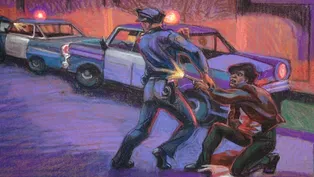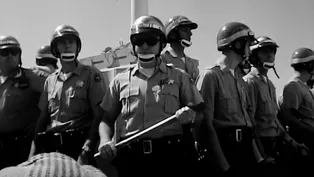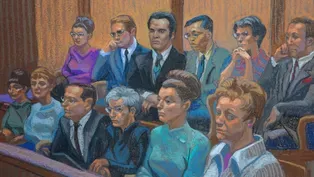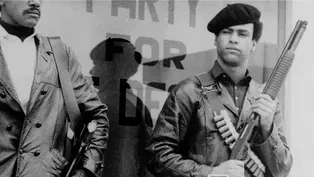
From Pianist to Black Power Revolutionary
Clip: Episode 1 | 2m 54sVideo has Closed Captions
The evolution of Huey P. Newton from classical pianist to black-power revolutionary.
Several people who knew him describe the evolution of Huey P. Newton, from classical pianist and philosopher to radical revolutionary and co-founder of the Black Panther Party, whose brazen armed occupation of the California Capitol in 1967 to protest gun control legislation became an iconic historical moment.

From Pianist to Black Power Revolutionary
Clip: Episode 1 | 2m 54sVideo has Closed Captions
Several people who knew him describe the evolution of Huey P. Newton, from classical pianist and philosopher to radical revolutionary and co-founder of the Black Panther Party, whose brazen armed occupation of the California Capitol in 1967 to protest gun control legislation became an iconic historical moment.
How to Watch American Justice on Trial: People v. Newton
American Justice on Trial: People v. Newton is available to stream on pbs.org and the free PBS App, available on iPhone, Apple TV, Android TV, Android smartphones, Amazon Fire TV, Amazon Fire Tablet, Roku, Samsung Smart TV, and Vizio.
Providing Support for PBS.org
Learn Moreabout PBS online sponsorship(somber music) - I was introduced to Huey Newto by a girlfriend who he was datin and I could certainly understand why she was so smitten with this young man.
He loved to play the piano.
Tchaikovsky was his favorite.
He was so good-looking and so charming and so soft-spoken that I was absolutely surprised when another side of Huey Newton came out as the revolutionary, as the leader of protest.
He wanted to change everything.
- We advocate that all Black people in America are taught what politics is all and what our history is all abou so that we can have self-identit and we can know where our streng We will know our enemies and we will know our friends.
- Huey had studied the laws and knew them front and backward and he used that as an organizing principle under this very real demand from the community for self-defe Self-defense meant that you were going to allow the police to come in with impunity and shake down, rough up, beat u and disrespect the Black communi - The first thing was to protect people in the community from bru and they were armed when they went out on their patrols in order to balance and equal th - We viewed the police as our en They were beasts in uniform, and they were trying to kill us, and it was up to us to defend ou (funky music) - As far as the Black Panther Party is concerned, we're willing to teach the police, the law, and also the other government of we can teach them the nature of the needs of our community, and we would like to see a peaceful solution.
So, I am not standing for violen but I do stand for self-defense.
- They began to show up at stops on the street involving police officers.
We began to have some concerns over that, obviously, because we would see some young typically turn out with weapons.
(crowd shouting) (somber music) Huey Newton believed in aggressive activities, believed in taking armed action indeed against police.
To me, that fits rather nicely in the term "thug."
(somber music) - Everyone was prepared for there to be a big blow-up one of these days, and that was how we put it, "one of these days."
Video has Closed Captions
The jury foreman of the 1968 Huey P. Newton murder trial describes the jury’s tense deliberations. (2m 36s)
Protests Outside the Courthouse
Video has Closed Captions
Massive street protests outside of the courthouse where Huey P. Newton was on trial for murder. (2m 55s)
Video has Closed Captions
A groundbreaking, history making jury of mostly women and minorities is selected for the trial. (2m 33s)
Video has Closed Captions
The untold story behind the murder trial of Black Panthers leader Huey Newton. (30s)
Providing Support for PBS.org
Learn Moreabout PBS online sponsorship














